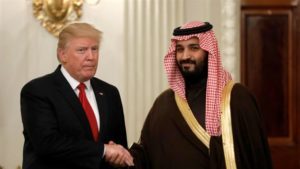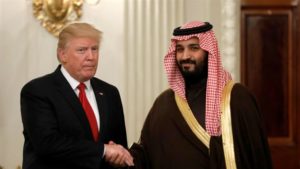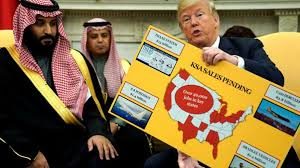
Trump And Arab Allies Looking For Options To Revive “Arab NATO” To Take On Iran
Washington: The Trump Administration is trying to make a novel security and political alliance with six Gulf Arab states, Egypt and Jordan to confront military expansion of Iran in the middle east region, the U.S. and Arab officials have said.

The US White House wants to have deeper cooperation between the countries on missile defense, military training, counter-terrorism and other important issues such as strengthening regional economic and diplomatic ties, four sources said.
The plan to make what officials in the White House and Middle East have called an “Arab NATO” of Sunni Muslim countries as allies will likely to further tensions between the United States and Shi’ite Iran, two countries already and increasingly at odds since President Donald Trump took office.

The administration, by making a quite effort, is hoping to make the Middle East Strategic Alliance (MESA), might be very soon discussed at a summit to be held provisionally scheduled for Washington on October 12-13, several sources said.
The White House confirmed that it had already started working over the concept of the alliance with “our regional partners now and have been for several months.”
Saudi officials thought of the idea of a security pact ahead of a Trump visit last year to Saudi Arabia where he announced a massive arms deal with them, but the alliance proposal did not take off the ground, a U.S. source said.
Sources from some of the Arab countries taking part also said they were aware of ongoing renewed efforts to activate the plan. Officials from other potential participants did not gave any response to requests for comment.
“MESA will serve as a bulwark against Iranian aggression, terrorism, extremism, and will bring stability to the Middle East,” a spokesperson for the White House’s National Security Council said.
The spokesperson out rightly declined to confirm that Trump would very soon host a summit on those dates and sources cautioned that it still remains uncertain whether the security plan will be finalized by mid-October.
Similar initiatives by previous U.S. administrations to develop a more better and formal alliance with Gulf and Arab allies have failed in the past.
Iran is accused by Washington, Riyadh and Abu Dhabi of trying to destabilize the region by creating troubles and unrest in some of the Arab countries through proxy groups and increasingly posing threats to Israel.
The Arab alliance would address many issues and work closely altogether with the Trump administration on confronting Iran.
You May Also Read: Are Your Aadhaar Details Safe? Don’t Feel Secure When Telecom Watchdog Chief’s Personal Details Are Already Leaked! See How!